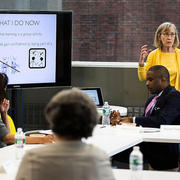
When Ofrit Liviatan attended the second of three Bok Faculty Lunches on Active Learning in the spring 2016 semester, it was a remark from a literature professor she didn’t know that made the greatest impact. The faculty presenter was philosophy professor Bernhard Nickel, explaining how he led students in creative exercises to construct a philosophical argument from a text. The literature professor raised her hand and said that she did it entirely differently because, after all, she wasn’t looking so much for the philosophical elements of a text. “What surprised you most?” might be a question she asked instead.
Liviatan teaches law and politics to undergraduates in the Government department, and her scholarship considers the gap between “law in books” and law in action. “I wouldn’t have thought of this before,” she says, “but I could ask my students a similar question, ‘What’s surprising about this judge’s opinion?’” Many of her students expect to become lawyers and may be good already at presenting arguments, but to refute other arguments by looking for alternative points of view comes less easily. “A limited view of the other side limits their powers of refutation,” Liviatan says, and perhaps catching them off-guard with a question that a humanist might ask of a text—what’s surprising?—could prove transformative.
Professor Elena Kramer from the department of Organismic and Evolutionary Biology was a co-presenter at the first of the spring’s Bok faculty lunches in February, but being an attendee earlier in the academic year is something she remembers more strongly. The focus of the lunch was the “flipped classroom” and its key principle of taking lectures out of the classroom to devote the precious class time to working out problems, but Kramer wasn’t sure about trying it herself in the plant biology course she co-teaches with her OEB colleague Missy Holbrook (her co-presenter at the February 25 faculty lunch). The course didn’t “lend itself clearly to these techniques,” Kramer wrote in an email, but one class period that was heavy on quantitative concepts opened up room to experiment. For that single class meeting, the Bok Center’s Learning Lab staff helped Kramer and Holbrook craft Holbrook’s lecture into three manageable pieces for videotaping which students were instructed to watch before class. After watching the videos, students came into the classroom and formed two groups to use what they learned from the online lectures to engineer a design for plant transport systems like sugars or water.
Several steps down from the event that brought them the idea, Kramer recalled that “the lunches basically gave us the confidence to try something new.”
